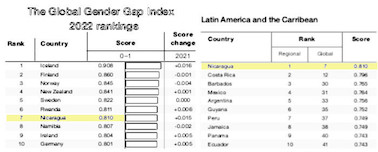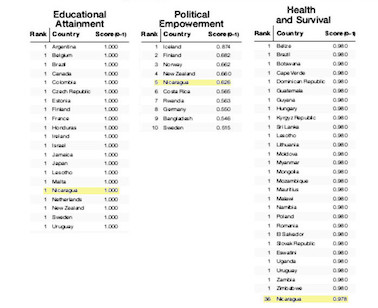| Few people now doubt that contemporary events worldwide point to a fast accelerating decline of North American and European countries as world leaders in practically any sphere of human activity. The collapse across the world in acceptance of US or European Union moral and political authority is clear from the refusal of most majority world countries to support US-led sanctions attacking the Russian Federation. The world may still be menaced by the pale shadows of bygone imperialist rule but these are fast being displaced by vibrant dreams and hopeful new prospects rapidly taking shape and coming to life. In that uncertain context, when a report like this year's World Economic Forum Report on the Global Gender Gap appears, people living in the majority world naturally look twice at its underlying principles, moral vision and assumptions. This is especially so in countries like Cuba, Nicaragua and Venezuela or other countries around the world similarly under attack from the same Western corporate and political elites who control the World Economic Forum itself. An important feature of the WEF report is its dependence on the data and presupppositions of diverse Western institutions and organizations. But despite this ostensibly unfavorable context, the WEF report does indeed recognize the tremendous advances in equality for women in Nicaragua, as summarized in this graphic:
Writer and community health worker, Becca Mohally Renk, has analysed in detail the results of this WEF report for the North American network in solidarity with Nicaragua. She notes that Nicaragua is a joint leader for gender equality in educational attainment and lies fifth in the world in terms of overall political empowerment. Becca might also have added that Nicaragua is also just 0.002 points off joint first place in the WEF index on Health and Survival. Related to that achievement, Becca points out that although just over 30% of Nicaraguan women are reported to marry young, the WEF reports that the mean age of women having their first child is now just under 27 years old, while the total fertility rate (births per woman) is reported to be 2.38.
In addition, the report ranks Nicaragua in joint first place of gender equality for
Nicaragua's economy and society is recovering from the legacy of almost two centuries of genocidal Spanish colonialism, followed by over 170 years of repeated US military interventions and US protected dictatorship and 17 years of deliberate US designed neoliberal under-development. Most recently the US and its allies inflicted wholesale economic destruction on Nicaragua through the failed coup attempt they organized in 2018. Now, the country is also recovering from the adverse effects of the global measures implemented to address Covid-19 and the damaging global economic effects of illegal US and allied government coercive measures against the Russian Federation. A second and equally serious failing is that the WEF report uses essentially neocolonial, rich country assumptions about how Nicaragua's economy actually works. Nicaragua's economy has little in common with an advanced Western economy based mainly on formal employment and relatively high wages. Nicaragua's is a socialist inspired model with over 70% of its economy based in the family, cooperative and associative sector, often called the popular economy. This model of economy has guaranteed that Nicaragua is practically self sufficient in terms of healthy, sustainable food production In addition, Nicaragua has the best public health infrastructure in Central America. Public health care is free. Education is free, including vocational technical education. Low income households receive subsidy for their electricity bills. Public transport costs are subsidized. University scholarships are available for low income students. Preschool and primary school children get free school meals. 99% of the country has electricity of which up to 70% is generated by renewable sources. Nicaragua's highway system is among the best in Latin America. Nicaragua is among the the most secure countries in Latin America and the Caribbean. Nicaragua's is among the most dynamic economies in Latin America, currently growing at around 5.5%. All of these economic characteristics have a gender dimension but they are only very partially reflected in the WEF report. Essentially, the WEF Global gender Gap report evades recognizing the implications of the details of Nicaragua's social and economic structure in promoting women's equality. And that evasion itself leaves open the question of how Nicaragua has managed to overcome its history of imperialist aggression so as to defend women's rights and equality better than far wealthier and far more economically advanced nations. This year Nicaragua will give the 43rd answer to that question when it celebrates the 43rd Anniversary of the triumph of the Sandinista Popular Revolution on July 19th 1979. That victory came just ten years, after the publication of the historic revolutionary program of 1969 which explicitly declared women's emancipation and equality as one of its principal objectives. The US tried to smother that program with a decade of the Contra War and then piled on top of that vicious attack another 17 years of neoliberal destruction. Despite everything, the US and its allies failed to destroy the Sandinista Revolution. Since January 2007, the original revolutionary program has become a reality, carried out by the Sandinista Front for National Liberation. Led by Comandante Daniel Ortega and Compañera Rosario Murillo, Nicaragua's Revolution has rescued women's equality from the feudal dead end identity politics serving the class needs of Western ruling elites. Under Daniel and Rosario the FSLN government has restored to women's rights their full meaning in terms of class justice and socio-economic democratization. And that is why Nicaragua has been able to vindicate its history and its revolutionary principles by leading the struggle for women's rights in Latin America and the Caribbean. But you will never learn that from reports by the World Economic Forum. Source URL |

